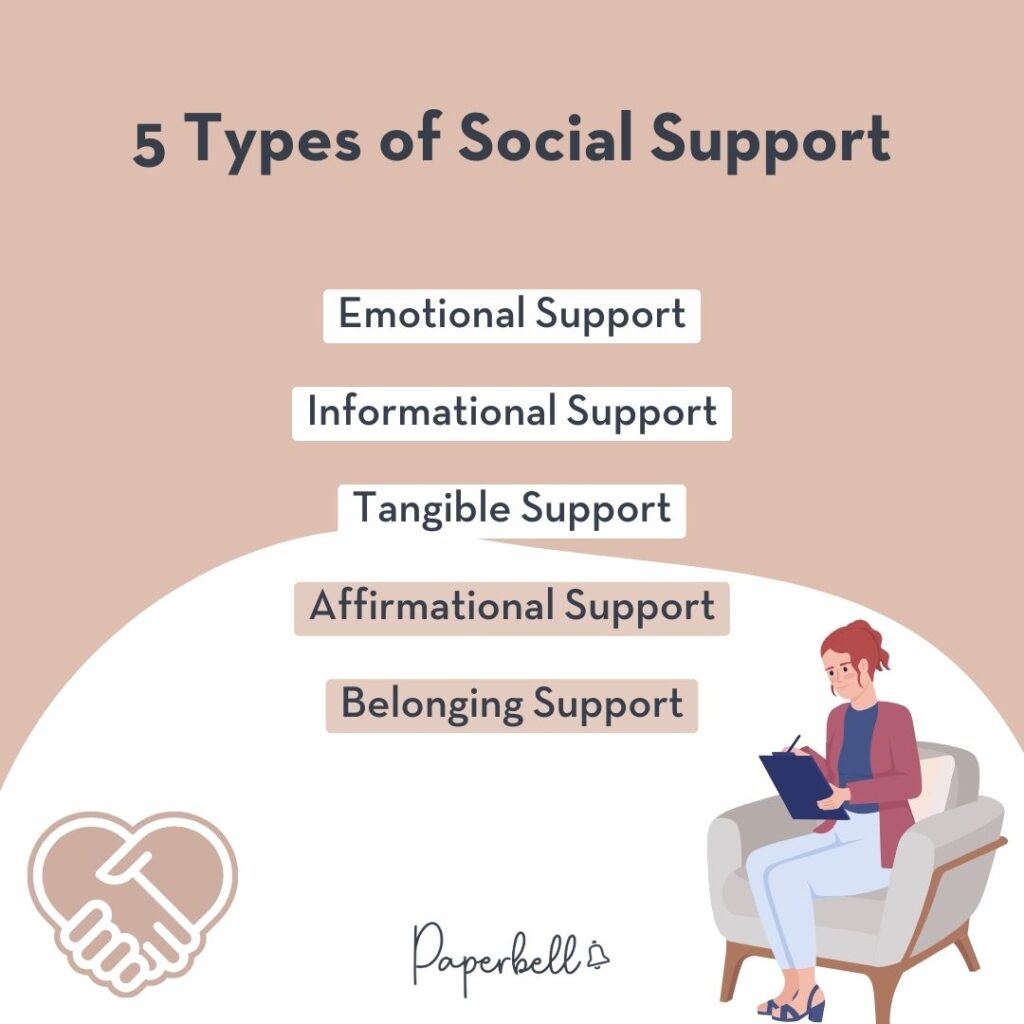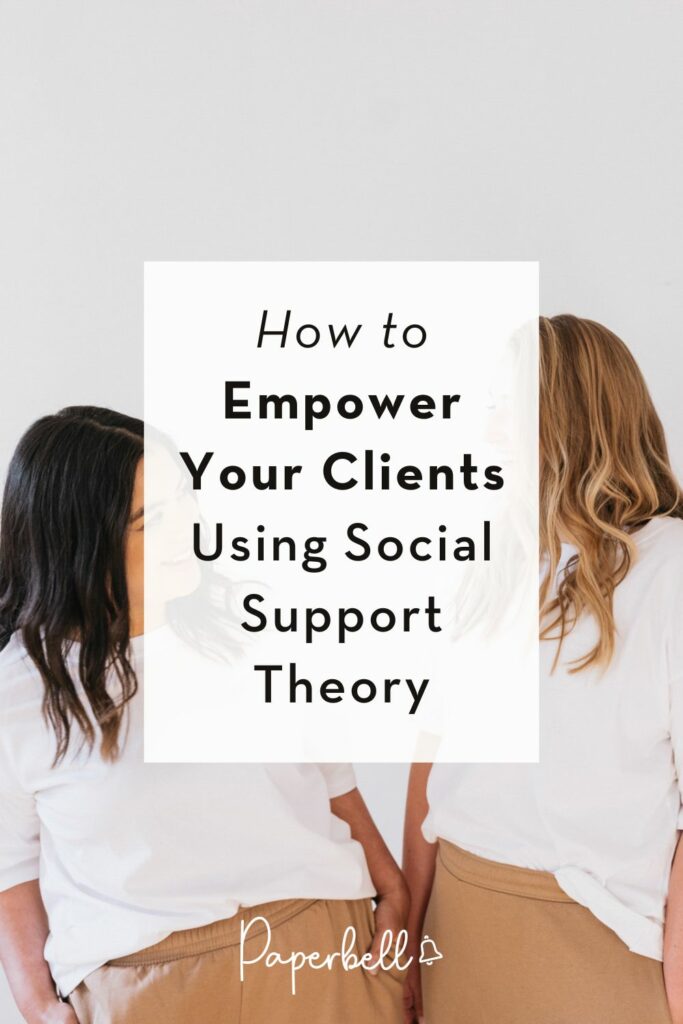Relying on others is more important for our overall well-being than we think.
Supporting relationships in all aspects of our lives impact our mental health and how we cope with stressful life events. This has a ripple effect on our work, home environment, and even our physical health.
Social support theory explains how receiving help in various ways contributes to our lives. It’s an essential perspective for coaches when determining how to best support their clients.
In this article, we’ll explore social support theory and its relevance to coaching.
What Is Social Support Theory?
Social support theory explains how people receive help and comfort from their social circles and connections.
According to researchers, the level of support available to us from others impacts our coping skills, mental health, and overall quality of life. Studies have shown that social support leads to better mental health outcomes, especially among vulnerable demographic groups like adolescents who rely more on others.
Beyond the tangible benefits of supportive relationships, receiving help also strengthens our bonds with others. This is true whether or not help is reciprocated or comes as a favor or a paid service.
Individuals with distinct needs may need different forms and levels of social support to function at their best and feel fulfilled. Here are the various types of social support that circulate our personal relationships.
What Are the 5 Types of Social Support?
Understanding the various types of support available empowers us to advocate for our various needs. Here are the five categories of social support we can seek from those around us.
1. Emotional Support
We seek emotional support when we face challenges or simply need someone to confide in.
A recent study has shown that emotional support from family members and significant others can lower our perceived stress level and decrease anxiety and depression.
Emotional support can come in many forms, from the reassuring voice on the other end of the phone to the comforting embrace of a friend, or even a shared glance of understanding with a stranger.
It doesn’t always manifest in grand words and gestures. Often, it’s a part of our everyday interactions, like a coworker lending a sympathetic ear after a tough day or a family member encouraging us in times of doubt.
Though seemingly small, these connections play a vital role in enhancing our overall wellness by fostering a sense of acceptance and understanding.
2. Informational Support
Even though we have most of the world’s information at our fingertips, it’s increasingly challenging to navigate what’s accurate and relevant to us and choose between endless options. Informational support can help us cut through the noise and consider sources we might not have considered before.
It can be a friend’s recommendation for a new restaurant or tips on installing a new device in our home. It may also be your next coaching training—or this article itself.
Informational support from trusted sources helps us learn more about ourselves and make informed decisions regardless of our relationship with the person we receive it from.
3. Tangible Support
Sometimes, we need favors or hands-on assistance, practical gestures that alleviate burdens and reinforce our interconnectedness.
From borrowing butter from a neighbor to receiving a ride from a coworker, tangible support plays a pivotal role in community and reciprocity.
Accepting it not only eases our immediate challenges but also instills a sense of reassurance that we’re not alone in times of need. In love languages, this one correlates with acts of service.
Interestingly, tangible or instrumental support has shown to be even more beneficial for the giver in studies. Helping out improves our well-being by fostering a sense of purpose and connection.
4. Affirmational Support
Feeling valued and respected is essential for our self-esteem and motivation.
Research has shown that expressing appreciation strengthens relationships and enhances psychological well-being for both the giver and receiver.
Whether we receive praise for our contributions at work or feel respected within our communities, affirmational support uplifts our spirits and fuels our drive to excel.
It makes us feel seen and reminds us that our efforts and feelings matter. Even people bursting with confidence need a little appreciation from time to time.
5. Belonging Support
Belonging gives us a profound sense of connection, even in physical separation. Being a part of a group enriches our lives and provides comfort when we face uncertainties.
Unfortunately, we’re living in what many call an epidemic of loneliness today. Experts say that, in some cases, loneliness can pose a health risk nearly as severe as smoking a pack of cigarettes a day.
On the flip side, a sense of belonging can not only improve our physical health but also our mental health and performance.
Our sense of belonging can be tied to our:
- Friend group and family
- Workplace or coworking space
- School or training group
- Any other interest or value-based circle we’re a part of

People and communities can offer multiple types of support simultaneously, depending on the social context and our needs.
For instance, a close friend might provide emotional support by listening to us during times of distress while also offering tangible support by helping us move to a new apartment.
Similarly, a community may offer informational support through workshops while fostering a sense of belonging through group activities.
Next, let’s look at possible sources from which we can receive social support.
Sources of Social Support
Our Inner Circle
When we think of the most trusted people in our lives, family often comes to mind first: parents, siblings, and extended relatives. They can provide a safe space, offer emotional reassurance, and practical help during times of need.
Unfortunately, not everyone’s close with the family they were born into. Some can rely on their blood relatives for one type of support (for example, small favors) but not for others (such as being accepted as the person they are).
However, we can always form our own adopted family with a life partner or close friends to serve as our support system—regardless of whether the traditional family model fits us or not.
Communities
Communities offer a sense of belonging beyond individual relationships. They are generally based on:
- Shared interests (such as a book club or music class)
- Shared values (such as spiritual networks or volunteering groups)
- Shared goals (such as people attending a town meeting)
- Or a mix of these
Community members may bond through collaboration, group activities, or shared learning. There are also support groups that form with precisely the purpose of supporting each other and fighting challenges together, like addiction, parenting, or loss.
Institutions and Professionals
Institutions and professionals such as healthcare providers, mental health professionals, and government agencies also serve as critical sources of social support. Many of these professionals now rely on mental health EHR systems to streamline care delivery and improve client outcomes.
These entities offer access to essential services like medical care, financial assistance, and counseling. They may address physical, emotional, or practical needs.
As a coach, you also belong to this category. You can support your clients in several ways—let’s explore how.
How Does Social Support Theory Apply to Life Coaches?
Here’s a breakdown of how life coaches can incorporate the five types of social support into their sessions with clients.
Emotional Support in Coaching
Life coaches offer emotional support by creating a safe environment for clients to express their thoughts and feelings without judgment. Through active listening, reflection, and empathy, you can help clients process challenging experiences and understand their feelings.
To take this further, you can help your clients uncover how they are currently supported and whether their needs are met. You can guide them in mapping out their social connections and overall support system to see whom they can contact for assistance.
Their perceived social support from specific individuals might differ significantly from actual reality. Additionally, you can teach them how to communicate their needs better and ask for support assertively.
Informational Support in Coaching
Coaches provide informational support by offering valuable resources to clients and sharing relevant knowledge with them. By pointing clients to articles, books, or courses for further learning, you can help them navigate their challenges and achieve their goals.
You can also offer workbooks and training videos for your coaching program. If you use Paperbell, you can include them in your custom packages, which will be automatically shared with your clients when they sign up for your program.
Assessments are another great way to help clients learn more about themselves and set more informed goals for their lives and careers.
Tangible Support in Coaching
No, you won’t jump in to save your client or solve their problems for them. However, if you think about it, everything you do in your sessions is pretty tangible.
You help your clients translate their goals into concrete action steps and identify the people who can help them achieve them. You also hold them accountable and guide them through roadblocks.
You may also lead them through coaching exercises or simulations that let them practice expressing themselves in specific situations. Additionally, you can refer them to other professionals or recommend self-care practices to them.
Affirmational Support in Coaching
You can boost your client’s self-esteem by acknowledging their strengths and celebrating their achievements. They need positive reinforcement and encouragement to build self-belief and emotional resilience.
You can also challenge your client’s limiting beliefs and help them cultivate a growth mindset. Create positive affirmations that support the beliefs they want to adopt.
Belonging Support in Coaching
You can infuse your services with a sense of belonging by bringing together multiple clients for group coaching programs, live sessions, or retreats. These are great opportunities for your clients to connect with like-minded people and receive peer support from those who struggle with similar problems.
Consider creating memberships with a community element. This way, your clients can connect online and share their experiences on your platform.
Become a More Effective Coach With Paperbell

As a coach, it’s essential that you run your sessions and the rest of your business effectively. Paperbell helps you streamline everything that happens behind the scenes so you can provide the best service to your clients.
It’s an all-in-one coaching website and client management tool that handles your bookings, contracts, payments, and more. It also keeps all your client information in one place and creates neat landing pages for your custom coaching packages.
Try Paperbell for free with your first client.

Editor’s Note: This post was originally published in May 2024 and has since been updated for accuracy.









